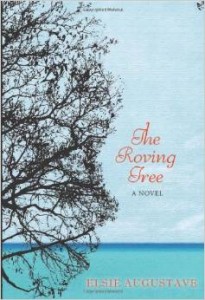Review: The Roving Tree by Elsie Augustave
Leah Dearborn
The Roving Tree tackles an ambitious scope of issues and themes, from the damaging nature of internalized racism to the impact of heredity versus environment. Adopted from a small Haitian village at the age of five, Iris’ life often reads like an all-too-real fairy tale in a United States poised to enter the Civil Rights Movement.
Iris herself is a very sympathetic character. Forced to bear the baggage of a culture that isn’t even her own by birth, she nevertheless refuses to be victimized by racism. As a child, she’s confronted by many well-meaning (or less so) adults, but struggles to find a place among them. Although The Roving Tree is not the first book to describe such an incident, it’s still shocking when strangers touch Iris’ head without her permission, just to find out what the hair on “those people” feels like.
Similar incidents populate the novel, and Iris’s early descriptions reveal a surreal side of the modern world. She calls airplanes a “house in the air above the clouds.” We tend to think little of such sights, but only because we have become accustomed to them— not because they are any less surreal. With the introduction of vaudou, the reader is often left with a sense of how disorienting it must be for Iris to be stretched between Haiti and the U.S., always trying to determine which culture is more relevant or “real” to her. Augustave holds off on revealing the entire tale of Iris’s adoption until about 50 pages in, keeping the reader interested and guessing at how she eventually came to live with the Winstons.
The clarity of Augustave’s writing is admirable. Unadorned and deceptively simple, she packs the entirety of a life into a relatively short span. There is no flowery, puffed-up prose to be found here, yet the story does not lack for emotional depth. If pressed to note a single flaw with The Roving Tree, in fact, I would say that the author occasionally tries to recreate too much of Iris’s life, since the narrative begins with her early childhood and ends in death, moving in near chronological order. However, this is the account of a mother describing herself to the child she will never meet, so it might be unfair to ask for any curtailment at all.
Overall, The Roving Tree is a layered and contemplative debut by a promising new author.

